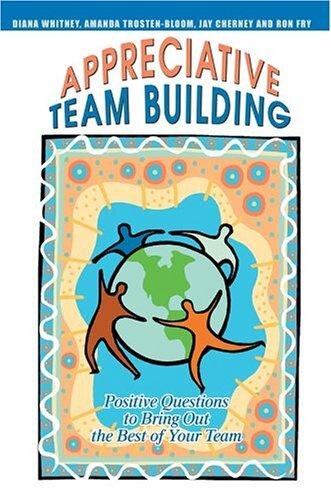Diana Whitney, Amanda Trosten-Bloom, and Jay Cherney. Appreciative Team-Building: Positive Questions to Bring Out the Best In Your Team. iUniverse, 2004.
Referenced in: Ministry Staff and Leadership Teams
LifeandLeadership.com Summary
This is an immensely valuable volume that one is likely to return to frequently. It is not written with churches in mind, but the insights translate quite well.
As a reflection of Appreciative Inquiry (AI), it suggests the value of positive questions (vs. demands, directives, or at worst, adversarial gestures) to generate the highest possible contribution of the human capital that makes up a team. Not only do these questions enhance the relational quality of the team, but they also encourage more creative conversations and higher energy, which in keeping with AI, leads to higher productivity. In a very real sense, this is part of the spirituality or energy of teams.
One might expect an AI book on team-building to be high on soft skills but low on performance, but this is not the case. The largest section of the book is entitled, “Ten Ways to Use Positive Questions to Build High Performance Teams.” These include:
- Selecting Team Members
- Affirming the Strengths
- Building Camaraderie and Trust
- Establishing Team Norms
- Celebrating Team Successes
- Clarifying Customer Requirements
- Aligning Strengths in the Face of Differences
- Creating a Project Visio and Goals
- Creating Team Identity and Enhancing Pride
- Energizing Team Meetings
Section 3 then actually suggests 48 questions one can interject to bring out the best in teams. This is a good section, though admittedly one should not expect 48 completely different questions, but a different twist on a few standard queries. You may not get the exact question you want, but what is there is likely to spur your creativity toward any one of the following goals.
- Aligning Purpose and Goals
- Clarifying Roles and Responsibilities
- Fostering Supportive and Empowering Relationships
- Creating Clear and Shared Procedures
- Promoting Leadership
- Elevating Energy and Spirit
- Advancing Productivity and Performance
- Stimulating Purposeful and Uplifting Communication
Section 4 proposes a ten-step process of actually using these questions in interview format that yields the best results. Sections 5 suggest how to build your own interview guides for this process.
This book would make a valuable contribution to a team leader’s toolbox. It is a good mechanism for taking teams beyond various levels of “stuck” to more productive levels of “unstuck,” provided one understands and is committed to the underlying philosophies of Appreciative Inquiry, which are adequately described in the book.
***For additional information on this resource, including reviews, click the bookstore links. Check the reference at page top or the links below for resource guides on related topics.***
See Resources on Over 100 Areas of Ministry Leadership:


